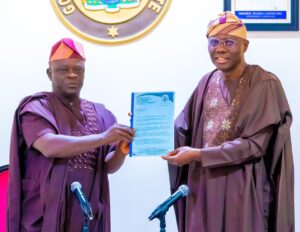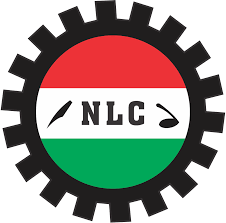
Over 15m people to benefit, as LASG kicks off food security systems & logistics hub
By Moses Adeniyi
An estimated number of over 15 million people have been projected to
benefit variously from a Food Security Systems and Logistics Hub Which the Lagos State Government (LASG) has flagged off.
It was gathered on an average that over five million people would gain access to wealth, while over 10million will gain accessibility to available foods through the Hub which is sited at Ketu-Ereyan, Epe Lagos.
As gathered, the Lagos State Food Security Systems & Central Logistics Hub will be built on 1.2 million square metres of land, having such components as Aggregation/storage facilities; Administrative offices; Trading/Brokering facilities; Packaging facilities; Processing facilities; Cold chain/dry goods services.
Others are Logistics Services/Trailer park; Water treatment plant; Health centre; Fuel station/Fire station; Abattoir and Lairage.
According to official information, the project will be implemented in two phases – the pilot phase, which has kicked off and the main phase.
The development of the Hub, it was gathered, will be done through a collaboration between the Lagos State Government and the private sector, through a “Design-Build-Finance-Operate-and-Transfer model.”
At the ceremonial flag-off of the construction of what will be the largest Food Logistics Park in Africa tagged “the Lagos State Central Food Security Systems & Logistics Hub” at Ketu-Ereyan, Epe Lagos, the State Governor, Mr. Babajide Sanwo-Olu, said the project is a proof of his Administration’s “commitment to addressing the challenges of stakeholders in the Agri-space and giving hope to the people through improved quality of life.”
According to Governor Sanwo-Olu, upon completion, the hub will create wealth “for more than 5 million people, feed more than 10 million Lagosians, guarantee food supplies for at least 90 days, provide storage facilities for more than 1,500 trucks per day, service the needs of thousands of operators per annum, and process large commercial transactions.”
“The project will improve productivity, guarantee greater returns for our farmers, by cutting out several layers of middlemen; facilitate improved access to modern processing and packaging services for farmers; and generate useful data for the use of government agencies, private sector players, and multilateral agencies,” Governor Sanwo-Olu said, while reflecting on the project’s significance.
“In addition, the Hub will provide a better buying experience for consumers; help achieve a reduction in logistics costs, while guaranteeing the standardization of quantity and quality for agricultural products.
“I can boldly say that this is one of the most important agricultural interventions that Nigeria has ever seen. The fact that it is taking place in Lagos, the most populous and fastestgrowing subnational entity in the country, means that it is bound to have significant national, regional, and continental impact,” he added.
On the strategy of the Government to outsmart the challenge of limited land mass, Sanwo-Olu said, “As a government that is fully aware of this potential, we have left no stone unturned in creating the policy frameworks that will power our emerging agricultural revolution.
“This is what led us to the development of the Lagos State 5-Year Agricultural & Food Systems Road Map (2021–2025), launched in April 2021; the overall objective being the attainment of total synergy in all food systems, from production to processing to distribution.
“The Road Map seeks to take full advantage of all the agricultural value chains in which Lagos State has competitive and comparative advantages, with a view to enhancing our level of selfsufficiency in food production from the current 18% to 40%.”
He called on the people of Epe and the Lagos East senatorial district to take full ownership of the project, charging them to ensure they “protect the facilities that will be put in place and always do everything to forestall all acts of sabotage and vandalism.”
“You all stand to benefit greatly from having this Hub here. The entire Epe Division will immediately enjoy the dividends, starting from this construction phase of the project.
“There will be many jobs for you, as well as various opportunities to supply construction materials. And when the project is up and running, it will attract complementary development: housing estates, financial institutions, business enterprises, and other ancillary services.
“This will indeed change the face of Ketu-Ereyun community and advance the development of the Epe Division,” he said.
He, however, charged the leadership of the State’s Ministry of Agriculture and other agencies of government involved in the project, as well as the project ideator and lead developer, Messrs. Origin Tech Group and its consortium partners, to ensure the timely delivery of this laudable project.
In her remarks, the State’s Commissioner for Agriculture, Ms. Abisola Olusanya said the Hub Which according to her “signifies the beginning of another legacy project of the Babajide Olusola Sanwo-Olu administration,” was significant in relation to the status of Lagos which is “unarguably one of the largest cities in Africa with over 24 million inhabitants; a sub-national with a GDP of about 20 African countries,” demanding that the Government must innovate to manage contending and competing needs of the people with speed and dexterity.
She mentioned that “the Lagos Central Food security systems and logistics hub project was conceived at the very beginning of the administration of Mr. Governor – who had the vision for a Lagos with food reserves, translating to a higher degree of availability, lower prices, less wastage, and more nutritious and wholesomefood products.
“Upon completion, the Food Security Systems & Central Logistics Hub will unleash the huge potential in both the midstream and downstream sectors of the agricultural and foods sector,” she added.
Lagos State remains the most populous State in the Country with an estimated population of about 22million and hence, the most important food market.
Some of the agriculture interventions of the Sanwo-Olu led Administration since in 2019 include Capacity-building – which have recorded thousands of Lagosians who have benefited from numerous agricultural training/internship programmes, particularly those targeted at youths, like the Lagos Agripreneurship Programme (LAP), among others.
Others include Partnerships with Multilateral agencies – particularly the World Bank, in programmes such as APPEALS (Agro Processing, Productivity Enhancement and Livelihood Support scheme) where 10,000 farmers and agro-processors have benefited from trainings, grant support, extension services etc, and more recently, the Lagos CARES Project where 13,955 farmers were beneficiaries of input, training, and facilities rehabilitation support.
Also, was a collaboration with Mastercard Foundation and IITA which saw to the training and empowerment of over 13,000 women & youths in horticulture, crop production and poultry.
Agricultural Value Chains Enterprise Activation programme – which has seen over 10,000 farmers who have benefited from input support such as fish feed, poultry feed, battery cages, fibre glass boats with outboard engines, smoking kiln, collapsible ponds, fish juveniles, Point-of-lay, growers, pig feed etc.
Investments in production and processing facilities – the soon-to-be-completed Imota Rice Mill, the largest in Africa, will produce 2.4million bags of 50kg rice annually, projected also to create thousands of jobs.
Mechanization – Investments in tractors and other equipment, to help drive down the cost associated with land clearing and production activities for farmers.



